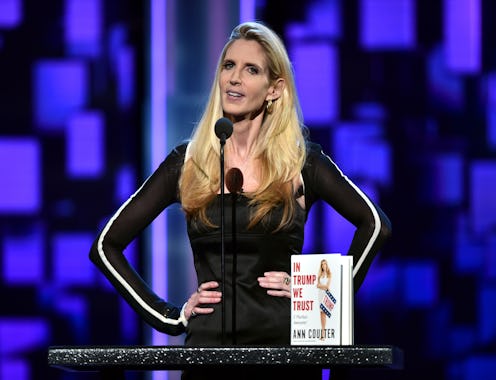News
Of Course Anne Coulter Hasn't Changed
Ann Coulter is not known for discretion or subtlety. Over her many years as a media presence, Coulter has come to personify political bomb throwing. On Nov. 7, the conservative provocateur struck again, with Coulter tweeting out on Election Day that if voting were restricted to only those "with at least 4 grandparents born in America," then Donald Trump would win the presidency. But in fact, it is precisely this kind of Euro-centric virtue signaling that explains much of Trump's unpopularity.
Coulter rules out voting for anyone with parents who are first or second-generation immigrants. Even a passing familiarity with Coulter's views on newcomers to the United States makes this yearning for a poll moratorium on children of foreigners unsurprising. Take just one book title from the Coulter shelf: ¡Adios, America!, subtitled "The Left's Plan to Turn Our Country Into a Third World Hellhole." Given Coulter's truck and trade (see: outrage, the fomenting of), one might excuse the messaging as intentional hyperbole.
But many of Donald Trump's most ardent supporters are not laughing. They feel the issue of immigration to be one of the biggest threats facing the nation, and Coulter's words are greeted with the earnest reception of the true believer. Titling her book "Goodbye America" in Spanish is indisputable virtue signaling of the Alt-Right variety, implicitly arguing it will be immigrants from Central and South America that transform the great and powerful U.S.A. into a shoddy network of crime-ridden favelas. In case anyone was still wondering, Coulter said herself she feared the "browning of America."
Bad news for Coulter: the United States is on track to become a majority-minority country around the year 2050. And perhaps even worse news for the Coulter crowd is that the reaction of most white Americans to becoming a minority amounts to... meh.
Over 60 percent of Americans are in favor of legal status for undocumented workers, and 43 percent want to add to that a path to citizenship. This remarkable openness actually puzzles many historians, who note that most dominant groups fear losing their privileged status.
The Alt-Right, of which Coulter can be considered an honorary founder, appeared to be counting on a much larger backlash against non-white demographic trends. And if white voters had flocked en masse to Trump, he could have absorbed the abysmal numbers from minority voting blocs, and still won the election.
But while Trump has made gains on his Republican predecessor, Mitt Romney, amongst whites without a college degree, he has lost big time with those who do hold a college degree. Ergo, this election model of blatantly appealing to racial fears of a disappearing white majority looks like a losing one.
And that includes imagining the "utopia" where just voters with four American-born grandparents are allowed to vote. Anti-Constitutional arguments aside, Coulter seems to have forgotten one pertinent fact in the Trump victory scenario she posits. This voting ban on the grandchildren of immigrants would preclude Trump – and his own children – from voting. Trump has a set of German-born grandparents, and four of his five children are from foreign-born mothers, Ivana and Melania.
Maybe Coulter will provide clarification on that little hiccup in her dream plan of vote restriction.
